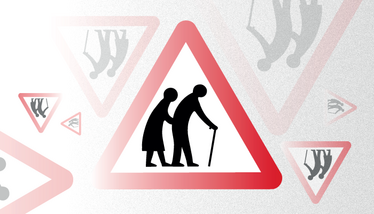Don’t Forget the Elderly
Older adults are underrepresented in clinical trials. This needs to change.
Sharmeen Roy | | 4 min read | Interview

Across the board, older adults are significantly underrepresented in clinical trials, comprising only around 25–40 percent of clinical trial participants, despite making up the majority of prescription drug users and having the highest disease burden.
If we focus only on cancer trials, patients 70 years of age or older represent 42 percent of the overall cancer population; however, only 24 percent of participants in trials registered with the FDA are 70 years or older. And fewer than 10 percent of this demographic participate in NCI sponsored clinical trials.
It is important to study the impact of medicines in elderly patients. Age-related physiological changes can affect pharmacokinetics and pharmacodynamics of the drug. For example, age can decrease the body’s ability to break down or remove certain medications from the system, which may mean that medications can stay in the body longer. Geriatric patients are more prone to adverse effects because of comorbidities and concomitant drugs, and the adverse effects can also be severe or less tolerated than in the younger population.
Reasons for excluding geriatric patients from trials include perceived frailty, cognitive impairment, comorbidities, and difficulty with informed consent. But it’s also true that overly stringent exclusion criteria can prevent many otherwise healthy older adults from participating.
The FDA released guidance in 2020 on enhancing diversity in clinical trials, recommending broader eligibility criteria, more flexible protocols, and targeted outreach to improve enrolment of underrepresented populations, including older adults. This draft guidance recommends that sponsors:
- Set an upper age limit only when clearly necessary for safety reasons or because of substantial evidence of different efficacy in the elderly.
- Consider including patients over 75, as they are often excluded.
- Evaluate pharmacokinetic differences in the elderly and make dose adjustments if needed.
- Assess safety endpoints, such as falls, fractures, and adverse drug reactions.
- Analyze efficacy and safety data separately for younger and older subjects.
Practical strategies that sponsor and clinical trial sites should also consider include revising overly stringent exclusion criteria, developing guidance on enrolling those with cognitive impairment, educating researchers on physiological aging, requiring study cohorts to include a certain percentage of older adults, and engaging with older participants to understand motivations and barriers when it comes to clinical research.
Taking part in a clinical trial can be difficult for any patient, which is why decentralized trials are gaining traction. Allowing procedures, assessments, and follow-up to be done remotely or at home reduces the travel burden and makes it easier for people to take part, particularly those with limited mobility or transportation options. For the elderly, the FDA guidance specifically suggests providing transportation assistance or conducting home visits, allowing flexibility in timing/frequency of study visits, using telemedicine and remote assessments when possible, as well as simplifying informed consent forms and procedures.
The FDA also highlights dosing. As noted, geriatric individuals often present with a complex array of comorbidities and age-related physiological alterations, which can significantly influence both drug metabolism and pharmacokinetics. Consequently, standardized dosing regimens, typically established within the constraints of clinical trials, may not be universally applicable. Fortunately, precision dosing platforms are now emerging that allow for dosing adjustments within approved drug labeling by using real-time, patient-specific data to tailor pharmacological interventions. My company has been working on developing such a technology, and we hope to also expand integration of AI into our dose modeling software.
Our aim is to create an adaptive approach for personalization of drug therapies, thereby potentially improving therapeutic outcomes and reducing adverse events – and making elderly patients feel more confident in taking part in a clinical trial. In the immediate term, our focus is on applying empirical evidence from patient data to recalibrate dose modeling for the elderly. This initiative addresses a notable gap in existing dosing guidelines, which often group older adults under the general “Adult” category, occasionally advising to default to adult dosing parameters without distinct considerations for the elderly. The industry needs to ensure that clinicians have greater confidence when dosing recommendations for older adults are not explicitly delineated.
There is no question that we need to get more elderly patients into clinical trials. People are living longer and we need to ensure medicines are safe for use in this patient population. Efforts are already being made to make trials more accessible, but, in my view, we need to go further.
Chief Strategy and Science Officer at DoseMe



















